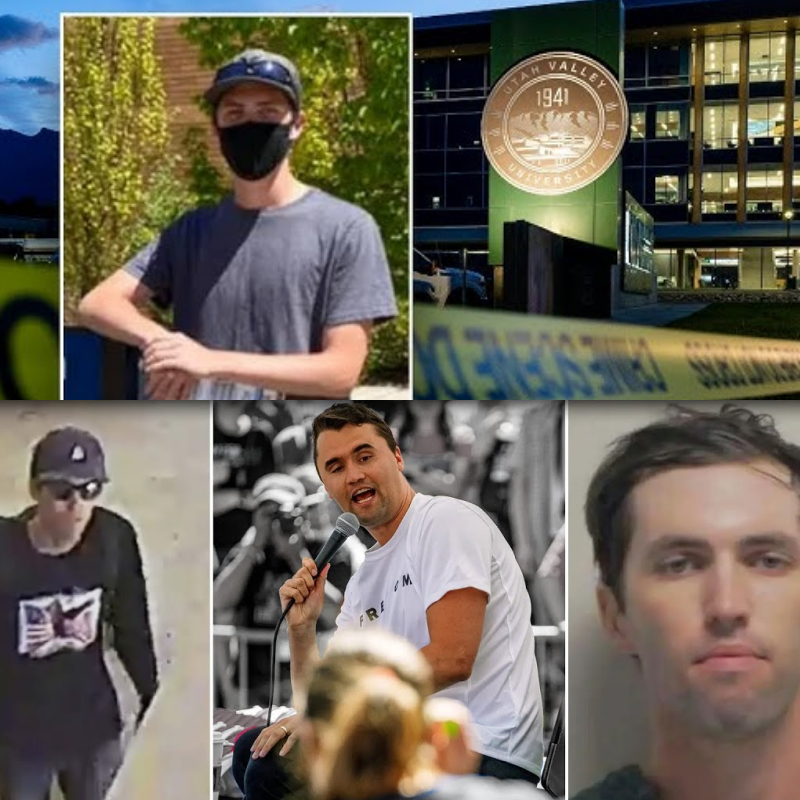Federal Conspiracy Net Widens: Associates of Accused Charlie Kirk Killer Face Legal Peril
Two days after the shocking assassination of conservative activist Charlie Kirk at Utah Valley University, the investigation is rapidly expanding beyond the alleged shooter. As federal and state authorities intensify their probe, attention is turning to the accused’s associates—particularly his roommate and anyone who may have aided, abetted, or conspired with him. Legal experts caution that those connected to the accused could soon find themselves ensnared in what’s being called the “federal conspiracy bucket,” facing serious charges with national implications.
On the Ground: A Community in Shock
Correspondents on the ground in Utah describe a community still reeling from the events. The alleged shooter, identified as Tyler Robinson, turned himself in to police after the attack. Reporters arrived at the family home in Washington, Utah—a quiet, upper-middle-class neighborhood near St. George—where a gray Dodge Challenger, believed to be the vehicle used by the shooter, sat conspicuously in the driveway.
“We were surprised to still see a Dodge Challenger sitting in the driveway,” said Matt Finn, reporting live from Spanish Fork, Utah, outside the Utah County Jail. “It’s not clear if it’s the same one, but the presence of law enforcement and even a chopper overhead tells you how seriously authorities are taking this.”
Police quickly evacuated the area around the family home after receiving “concerning information,” underscoring the tense and rapidly evolving nature of the investigation.
.
.
.

A Nation Responds: From Vigil to Vigilance
The shockwaves of Kirk’s assassination have resonated far beyond Utah. Governor Spencer Cox praised the peaceful, unified response of Utahns, contrasting it with the violence seen in other parts of the country during previous periods of political unrest.
“There is no rioting, no looting, no cars set on fire, no violence,” Governor Cox said. “There were vigils, prayers, and people coming together to share their humanity. That, I believe, is the answer to this.”
At Utah Valley University, students gathered in peaceful vigils to honor Kirk’s legacy. Many admitted they disagreed with Kirk’s politics but felt compelled to support free speech and reject violence. “We didn’t entirely agree with Charlie, but we’re out here to support him now,” said one student. “This is waking people up here and on campuses across the country.”
Paul Morrow, a retired inspector and attorney, noted that Kirk’s legacy may only grow stronger in the wake of his death. “What the alleged shooter attempted to stamp out is going to have the opposite effect. These kids are awake, and I’m hearing it elsewhere—at Harvard and other campuses. Advocates of free speech aren’t having this.”
The Federal Conspiracy “Bucket”: Legal Peril for Associates
As the investigation deepens, legal analysts warn that anyone who aided the accused—directly or indirectly—could face severe consequences under federal law. The so-called “federal conspiracy bucket” refers to the broad net cast by conspiracy statutes, especially when crimes cross state lines or involve the internet.
Paul Morrow explained the stakes: “If they develop a co-conspirator from online activity—Discord or elsewhere—that puts you in a conspiracy bucket federally. The internet gives you federal jurisdiction, and now you have a much stronger federal charge.”
He referenced the Boston Marathon bombing case, where roommates of the bombers were arrested for obstructing justice and lying to federal investigators. “This person had better be forthright. Lying to the federal government is a crime, and obstruction of justice is a serious charge.”
The Roommate’s Role: Messages Under Scrutiny
A key focus of the investigation is the alleged shooter’s roommate. Authorities are examining messages exchanged between the accused and his roommate, which reportedly include references to retrieving a rifle from a “drop point,” leaving the weapon in a bush, and monitoring the area. Other messages mention bullets, a scope, and the uniqueness of the rifle.
“The content of these messages raises serious questions about what the roommate knew and when,” said Morrow. “If the roommate was aware of the plot or helped in any way, even after the fact, that could constitute conspiracy or obstruction.”
Governor Cox confirmed that, as of now, no one else has been charged. However, he acknowledged that the investigation is ongoing and that the roommate’s involvement remains an open question.
Community Divided: Neighbors React
Neighbors in the St. George area expressed a mix of shock and resignation. One neighbor, interviewed by reporters, said she was “unfortunately not surprised” by the shooting, citing the spread of political violence and hatred across the country.
The neighborhood, described as scenic and well-manicured, is not accustomed to such high-profile crime scenes. The presence of police, media, and a hovering helicopter has shattered the area’s tranquility.
A National Conversation on Free Speech and Violence
Charlie Kirk’s death has reignited a national debate about free speech, political violence, and the boundaries of civil discourse. Many students at Utah Valley University, even those who disagreed with Kirk’s views, emphasized the importance of dialogue and the rejection of violence.
“This is waking people up,” said one student. “It’s not just about politics—it’s about what kind of country we want to live in.”
Governor Cox drew a direct line between the peaceful vigils for Kirk and the legacy of the civil rights movement. “Charlie stood for freedom of speech and open dialogue. We’ll see where that goes, but I believe his legacy will inspire a new generation to value those principles.”
The Broader Legal Landscape
Legal experts say the case could set important precedents. If federal prosecutors pursue conspiracy charges against associates of the accused, it could send a strong message about the consequences of aiding or abetting political violence—even indirectly or online.
“Conspiracy charges are powerful tools,” said Morrow. “They allow prosecutors to hold not just the perpetrator, but anyone who helped, accountable. If you’re involved in planning, providing resources, or even just encouraging the act, you could be on the hook.”
He added that the use of the internet to coordinate or communicate about the crime strengthens the federal government’s hand. “The internet gives you federal jurisdiction. That’s a game-changer.”

What’s Next: The Road Ahead
As the investigation unfolds, the nation watches closely. Will the roommate or other associates be charged? Will federal conspiracy statutes be invoked? And what will the long-term impact be on America’s political and legal landscape?
For now, the focus remains on justice for Charlie Kirk and the search for answers. Authorities continue to comb through digital evidence, interview witnesses, and piece together the events leading up to the assassination.
Conclusion: A Moment of Reckoning
The assassination of Charlie Kirk has become more than just a criminal case—it’s a moment of reckoning for a nation grappling with issues of violence, free speech, and accountability. As investigators cast a wide net in search of co-conspirators, the message is clear: those who aid, abet, or conspire in acts of political violence will face the full force of the law.
In the words of Governor Cox, “There were vigils, prayers, and people coming together to share their humanity. That, I believe, is the answer to this.” Whether the nation can heed that call remains to be seen.





